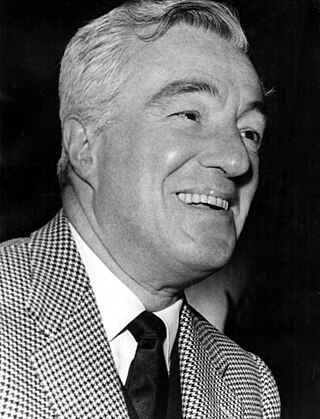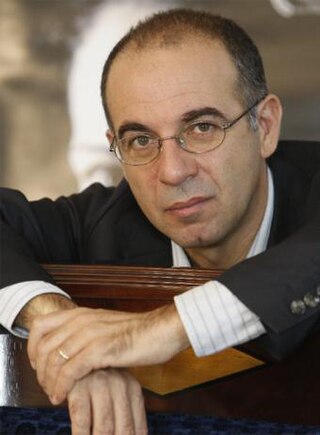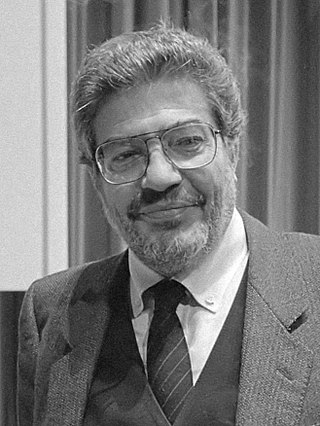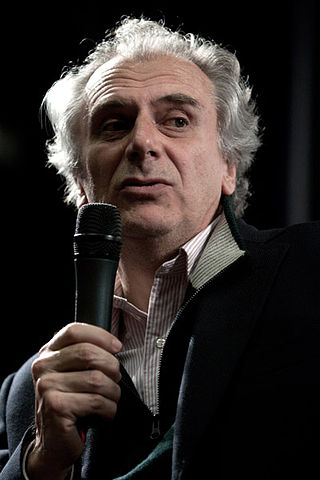Related Research Articles

The cinema of Italy comprises the films made within Italy or by Italian directors. Italy is one of the birthplaces of art cinema and the stylistic aspect of film has been one of the most important factors in the history of Italian film. As of 2018, Italian films have won 14 Academy Awards for Best Foreign Language Film as well as 12 Palmes d'Or, one Academy Award for Best Picture and many Golden Lions and Golden Bears.

Vittorio De Sica was an Italian film director and actor, a leading figure in the neorealist movement.

Alberto Sordi was an Italian actor, comedian, director, singer, and screenwriter.

Domenico Modugno was an Italian singer, actor and, later in life, a member of the Italian Parliament. He is known for his 1958 international hit song "Nel blu dipinto di blu", for which he received the first Grammy Awards for Record of the Year and Song of the Year. He is considered the first Italian cantautore.

Giuseppe Tornatore is an Italian film director and screenwriter. He is considered one of the directors who brought critical acclaim back to Italian cinema. In a career spanning over 30 years he is best known for directing and writing drama films such as Everybody's Fine, The Legend of 1900, Malèna, Baarìa and The Best Offer. His most noted film is Cinema Paradiso, for which Tornatore won the Academy Award for Best Foreign Language Film. He has also directed several advertising campaigns for Dolce & Gabbana.

Giuseppe Avati, better known as Pupi Avati, is an Italian film director, producer, and screenwriter. He is known to horror film fans for his two giallo masterpieces, The House with Laughing Windows (1976) and Zeder (1983).

Giovanni "Nanni" Moretti is an Italian film director, producer, screenwriter, and actor.

Ettore Scola was an Italian screenwriter and film director. He received a Golden Globe for Best Foreign Film in 1978 for his film A Special Day and over the course of his film career was nominated for five Academy Awards for Best Foreign Language Film.

Aldo Fabrizi was an Italian actor, director, screenwriter and comedian, best known for the role of the heroic priest in Roberto Rossellini's Rome, Open City and as partner of Totò in a number of successful comedies.

Gastone Moschin was an Italian stage, television and film actor.

Matteo Garrone is an Italian filmmaker.
The Nastro d'Argento is a film award assigned each year, since 1946, by Sindacato Nazionale dei Giornalisti Cinematografici Italiani, the association of Italian film critics.
Marcello Baldi was an Italian director and a screenwriter.

Marco Risi is an Italian film director, screenwriter, film producer and cinematographer.

Chiamatemi Francesco is a 2015 Italian biographical film about Pope Francis directed by Daniele Luchetti.

Taodue is an Italian film and television production company in MFE - MediaForEurope. It was founded by Pietro Valsecchi and Camilla Nesbitt in 1991.
Matteo Rovere is an Italian director, screenwriter and producer. He's the youngest Italian film-maker to have won the Nastro d'argento for best producer, with I Can Quit Whenever I Want.
Vivo Film, established in Rome at the beginning of 2004 by Gregorio Paonessa and Marta Donzelli, is an Italian independent production company for art-house films.

Gabriele Mainetti is an Italian film director, actor, screenwriter, composer and producer.
Francesca Valtorta is an Italian actress.
References
- 1 2 3 Mario Sesti (1996). La "scuola" italiana: storia, strutture, e immaginario di un altro cinema, 1988-1996. Marsilio. p. 116. ISBN 978-88-317-6477-3.
- ↑ Crippa, Maurizio (January 5, 2016). "'Come e perché io e Checco Zalone abbiamo dimostrato che il cinema italiano è nudo'. Parla Pietro Valsecchi" (in Italian). Il Foglio . Retrieved January 25, 2016.